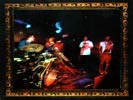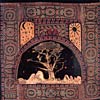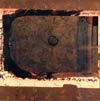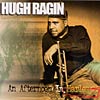
 |
|
|
 |
 |
 |
 |
 |
 |
 |
 |
|
|
 |
Over the past decade or so a quiet revolution has taken place in the music scene of the Ann Arbor area. The dominant mode is still modern bop-derived jazz, but a growing number of young musicians has turned to more avant-garde forms of improvised music. Some of this new spirit has been documented on recordings; this is important since many of these players move on to other cities and are replaced by the next crop of youngsters. The four CDs that are the subject of this review document some of the best groups of a certain period. We shall undoubtedly be hearing from them again as they pass through on tour with established ensembles and with their own groups.
For a while it seemed
that Transmission was performing in Ann Arbor every week and there
are still yellowing posters on telephone poles signaling their past  performances.
The quartet of Colin Stetson on saxophone, Stuart Bogie on clarinets,
Eric Perney on bass, and Andrew Kitchen on drums and percussion had a
loyal following and although they now all live in San Francisco, they
often come through town. Their CD Transmission (thekitch@hotmail.com)
provides ample testimony of the energy and excitement generated by the
group. Their eclectic approach to music making includes elements of rock,
jazz, klezmer, and various folk styles, working through a broad range
of moods, from quiet meditative passages to roaring stomps. All of this
is informed by a youthful energy, virtuoso horn playing, and a strong
sense of rhythm.
performances.
The quartet of Colin Stetson on saxophone, Stuart Bogie on clarinets,
Eric Perney on bass, and Andrew Kitchen on drums and percussion had a
loyal following and although they now all live in San Francisco, they
often come through town. Their CD Transmission (thekitch@hotmail.com)
provides ample testimony of the energy and excitement generated by the
group. Their eclectic approach to music making includes elements of rock,
jazz, klezmer, and various folk styles, working through a broad range
of moods, from quiet meditative passages to roaring stomps. All of this
is informed by a youthful energy, virtuoso horn playing, and a strong
sense of rhythm.
Another group that has
been heard often in Ann Arbor is the trio Explosion: Cerebral,
consisting of Matt Bauder on tenor sax, Zach Wallace on bass, and Eric
Roth on  drums.
Their eponymous CD explosion: cerebral (esroth@hotmail.com)
contains eight compositions by members of the trio as well as "Rosmosis,"
written by trombonist Roswell Rudd. The group achieves an amazing variety
of moods and textures for such limited instrumentation. Sometimes it engages
in quiet abstract collective improvisations full of extended techniques,
strange sounds, and out-of-tempo rumblings, only to move slowly to a roaring,
screeching climax. On other compositions the bass or drums sets up a swinging
groove and the sax rides over it in full-toned splendor. Indeed, Bauder's
mighty saxophone sound is a wonder to behold. He plays with full confidence
on the whole range of his horn and is in perfect control, whether he is
playing straight ahead with a big deep sound on the lower notes or singing
high in the altissimo range. Wallace is likewise in full control of various
techniques of bass playing and uses his virtuosity with wit, intelligence,
and soul.
drums.
Their eponymous CD explosion: cerebral (esroth@hotmail.com)
contains eight compositions by members of the trio as well as "Rosmosis,"
written by trombonist Roswell Rudd. The group achieves an amazing variety
of moods and textures for such limited instrumentation. Sometimes it engages
in quiet abstract collective improvisations full of extended techniques,
strange sounds, and out-of-tempo rumblings, only to move slowly to a roaring,
screeching climax. On other compositions the bass or drums sets up a swinging
groove and the sax rides over it in full-toned splendor. Indeed, Bauder's
mighty saxophone sound is a wonder to behold. He plays with full confidence
on the whole range of his horn and is in perfect control, whether he is
playing straight ahead with a big deep sound on the lower notes or singing
high in the altissimo range. Wallace is likewise in full control of various
techniques of bass playing and uses his virtuosity with wit, intelligence,
and soul.
A very different approach
to the new music is represented by Aaron Siegel's BLOCK, a quartet
consisting of the leader on drums, Andrew Bishop on tenor sax and  clarinet,
Jacob Garchik on trombone, and Tim Flood on bass. Their CD is entitled
BLOCK (www.umich.edu/~asiegel).
Siegel is the composer of all six compositions on the recording, and if
one were to make any analogy, it would be to Gerry Hemingway, the great
contemporary drummer-leader-composer. Like Hemingway, Siegel has a vision
of a group sound and knows how to pick just the right players with which
to work. All four musicians are masters of their instruments and, perhaps
even more important, know how to keep their individual voices while blending
together in a group. Bishop's deliberate, thematic improvisations on tenor
and clarinet impress once again, as does the sensitive trombone playing
of Garchik. Flood is a master of this kind of music; he can go far out
without loosing any sense of swing. All of this is held together by Siegel's
complex drumming; he prods and comments on the proceedings and plays the
traps just as one would expect from a composer. The CD is held together
by the compositional style of the leader, who manages to write in a broad
range of styles without surrendering his individual voice.
clarinet,
Jacob Garchik on trombone, and Tim Flood on bass. Their CD is entitled
BLOCK (www.umich.edu/~asiegel).
Siegel is the composer of all six compositions on the recording, and if
one were to make any analogy, it would be to Gerry Hemingway, the great
contemporary drummer-leader-composer. Like Hemingway, Siegel has a vision
of a group sound and knows how to pick just the right players with which
to work. All four musicians are masters of their instruments and, perhaps
even more important, know how to keep their individual voices while blending
together in a group. Bishop's deliberate, thematic improvisations on tenor
and clarinet impress once again, as does the sensitive trombone playing
of Garchik. Flood is a master of this kind of music; he can go far out
without loosing any sense of swing. All of this is held together by Siegel's
complex drumming; he prods and comments on the proceedings and plays the
traps just as one would expect from a composer. The CD is held together
by the compositional style of the leader, who manages to write in a broad
range of styles without surrendering his individual voice.
The Northwoods Improvisers
have been playing and recording together for some time. Their latest CD
is Lightning Darkness (Entropy
005), on which the trio (Mike  Gilmore,
vibes, cheng, bone guitar, percussion, Mike Johnson, bass, wood flutes,
percussion, and Nick Ashton, drums, percussion) is joined, on some numbers,
by Ben Bracken (tamboura, percussion) and Kirk Lucas (cello, tambourine,
bowed banjo). Together they create a seemingly limitless variety of sounds
and textures, with various percussion instruments often rocking out into
subtle patterns over which vibes and various string and wind instruments
ride. The rhythms vary from backbeat rock to complex folk pulses and free
patterns. Some compositions are raucous, others have no obvious rhythmic
pattern but explore sonic textures in minute detail. This group has created
a unique world of sound that draws on many sources, from contemporary
classical to European and Asian folk music to Sun Ra, whose "God is More
than Love" receives a highly original interpretation.
Gilmore,
vibes, cheng, bone guitar, percussion, Mike Johnson, bass, wood flutes,
percussion, and Nick Ashton, drums, percussion) is joined, on some numbers,
by Ben Bracken (tamboura, percussion) and Kirk Lucas (cello, tambourine,
bowed banjo). Together they create a seemingly limitless variety of sounds
and textures, with various percussion instruments often rocking out into
subtle patterns over which vibes and various string and wind instruments
ride. The rhythms vary from backbeat rock to complex folk pulses and free
patterns. Some compositions are raucous, others have no obvious rhythmic
pattern but explore sonic textures in minute detail. This group has created
a unique world of sound that draws on many sources, from contemporary
classical to European and Asian folk music to Sun Ra, whose "God is More
than Love" receives a highly original interpretation.
Almost the same cast comes
together as the Remote Viewing Ensemble (Entropy
003). Ben Bracken, Mike Gilmore, and Mike Johnson play on the first
five cuts  and
are joined by Kirk Lucas on "Adhuta." Their repertoire of acoustic and
electric instruments is too large to enumerate. It is impossible to describe
adequately the subtle complexity of this music, which owes much to the
influence of composers such as Takemisu, but is ultimately original and
without direct precedent. Similarly to some of the parts of the previous
release, this music is based on shifting sounds and textures; some are
easy to identify, but others seem to come from another world. Various
drones come and go, but unlike the Northwoods group, in this combination
the musicians rarely rely on swinging rhythmic patterns. I would call
this music "ambient" were it not for the obvious negative connotations
that this term has acquired. This is stunning music that grows upon you
with each listen.
and
are joined by Kirk Lucas on "Adhuta." Their repertoire of acoustic and
electric instruments is too large to enumerate. It is impossible to describe
adequately the subtle complexity of this music, which owes much to the
influence of composers such as Takemisu, but is ultimately original and
without direct precedent. Similarly to some of the parts of the previous
release, this music is based on shifting sounds and textures; some are
easy to identify, but others seem to come from another world. Various
drones come and go, but unlike the Northwoods group, in this combination
the musicians rarely rely on swinging rhythmic patterns. I would call
this music "ambient" were it not for the obvious negative connotations
that this term has acquired. This is stunning music that grows upon you
with each listen.
In a final note I would
like to draw our readers' attention to a new release by trumpeter Hugh
Ragin, An Afternoon in  Harlem
(Justin
Time 127-2). On this fine date Ragin is joined, on various cuts, by
Andrew Cyrille and Bruce Cox on drums, David Murray on bass clarinet,
and even by Amiri Baraka, who reads one of his poems. From our perspective
it is important to highlight the contributions of Detroit's own Jaribu
Shahid on bass, and former Ann Arbor pianist Craig Taborn. Both have been
on the road for some time with James Carter, but it is nice to hear them
in a different context. Taborn gets quite a bit of room on this recording
and he makes the most of it, shining as an accompanist and as a soloist.
For those who are enamoured of his playing, this CD is a must!
Harlem
(Justin
Time 127-2). On this fine date Ragin is joined, on various cuts, by
Andrew Cyrille and Bruce Cox on drums, David Murray on bass clarinet,
and even by Amiri Baraka, who reads one of his poems. From our perspective
it is important to highlight the contributions of Detroit's own Jaribu
Shahid on bass, and former Ann Arbor pianist Craig Taborn. Both have been
on the road for some time with James Carter, but it is nice to hear them
in a different context. Taborn gets quite a bit of room on this recording
and he makes the most of it, shining as an accompanist and as a soloist.
For those who are enamoured of his playing, this CD is a must!